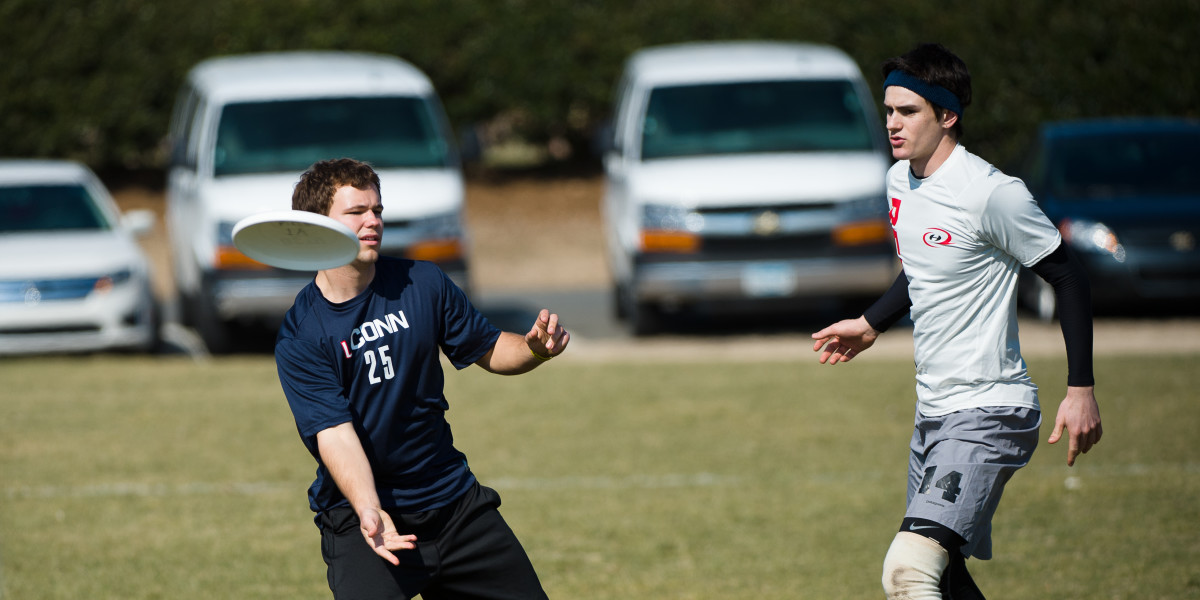 UltiPhotos.com" />
Kevin Leclaire - UltiPhotos.com
UltiPhotos.com" />
Kevin Leclaire - UltiPhotos.com
Mental Preparation
Someone asked me about what I do as a coach to get my team ready for a tournament, with the first spring college tournaments of the season already upon us.
Naturally, I think a lot about physical preparation: be better conditioned, run harder, run faster. Make sure the team is throwing, make sure they’ve done their workouts. However, that’s really missing the most important thing, even in early season tournaments: mental preparation.
Every team is going to have different demons to tackle from year to year. Some teams can get too excited about how good the team performed in the fall, some can be too complacent, and others can be fixated on a rival match-up that may not even come to fruition.
Coming into the first tournaments of the season, all of these games matter, because if we don’t give our best effort we can’t learn about ourselves. Sure, we’d like to win; that’s fun. But I’ll tell my team: it’s not about looking ahead. We want to focus on the points in front of us, do our best, reflect, work hard and get better for the series.
Talk to your team. Look for the warning signs of took much talk about “How good we’re going to be”, or “I can’t wait to beat team X”. I find that in the limited time you have with the team, you’re probably hearing that stuff. As a coach, you have to be captain of the ship and steer away from the rocks.
Catching in the Wind
Another aspect of the game I’ve been thinking about lately is catching in the wind, especially after reading a post on r/ultimate that asked for tips on throwing in the wind.
Really, I think it’s just as important to teach catching in the wind.
We all went through those miserable windy days where guys couldn’t throw further than 15 yards. Well, maybe only people in windy areas really know that feeling. Once year in Buffalo we’d get a day of 40 MPH+, and you really couldn’t do much. I remember trying to throw a huck upwind where the disc sailed 200 yards the other way. What can you do with these practices?
At UConn this year, we’ve utilized the box drill from practice to practice. Don’t know the box drill? Make a box 15 yards wide and have lines of players set up at each of the four cones. The first cut goes towards the center of the box and out towards the edge, while a player on the cone with the disc hits the cutter in in stride. Then, the cutter on the next cone cuts to the next sideline. You can work up to using two discs and start at opposite corners, and make cuts to the center and out towards the sideline. I don’t always like the box drill for teaching cuts, or for realism, but it does provide a challenge for a variety of reasons.
It’s a good drill in that it gives a lot of reps, and that’s really important for beginners. You can adjust it to practice inside throws, off-hands, etc. When focus is bad, when you see drops within a drill, even on top teams, turn to a simple drill with a high goal. For us, that was 100 throws and catches in a row. Some may balk at that number for their young teams, but it’s surprising what you can achieve even with beginners.
On the days where the wind makes it miserable, and scrimmaging just produces the “I want to go indoors” attitude, I usually end practice on a box drill. The adaptation is that throwaways are allowed, but drops are not. In the wind, throws have to be delivered with an oomph, because a dainty throw gets picked up and whisked away. If you only practice catching on non-windy days you only get used to catching perfect discs that your grandmother could catch. We set a high goal of a 100 throws in a row without any drops. Sometimes we have to lower that number. But I never leave from that drill unsatisfied with our effort to get better.







Comments Policy: At Skyd, we value all legitimate contributions to the discussion of ultimate. However, please ensure your input is respectful. Hateful, slanderous, or disrespectful comments will be deleted. For grammatical, factual, and typographic errors, instead of leaving a comment, please e-mail our editors directly at editors [at] skydmagazine.com.